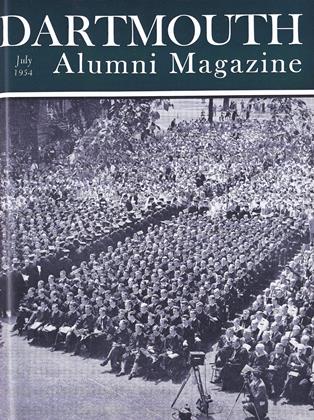The Fraternity Referendum
To THE EDITOR:
I have read Mr. May's piece reporting on the so-called referendum on fraternal racialreligious bars and agree with the writer that it is indeed a rare instance where the student body, rather than a college administration or a state legislature, issues ultimatums to national fraternities.
I am a non-graduate of Dartmouth but a fraternity man, and I cannot see how the general student body has any business dictating to fraternities, especially when the non-fraternity students no doubt greatly outnumber the fraternity men; I don't know the percentage. To my sincere belief, a fraternity is a social club and as such should be permitted to select its members, like any club or civilian organization.
No doubt many students would like to join clubs or fraternities, or even make the athletic teams if there were no specific qualifications, but there are of one kind or another, and justifiably so.
Apparently it is too late to do much about this situation now and my voice is only another crying in the wilderness; however, I had to express my displeasure and concern because I believe in national fraternities. I am proud of mine and have been active in three chapters, and was once a national officer of Delta Tau Delta.
Washington, D. C.
EDITOR'S NOTE: The vote of the undergraduates, and the official action of the Trustees, giving national fraternity chapters at Dartmouth until 1960 to eliminate all discriminatory clauses in their charters does not alter the recognition of fraternities as social organizations or the right of students to choose their own fraternity brothers.
What all Dartmouth fraternities will have the right to do after i960 is to pledge any men they choose, without discriminatory restriction from outside the College. The student vote against fraternity discrimination, 1,976 to 218, must have included strong support from fraternity as well as non-fraternity men.
Jim Smith's Part
To THE EDITOR:
I wish to call to your attention a gross omission, starting on Page 31 of your May issue. The article by William Mansfield '54 concerns the Dartmouth Crew and as written appears to give no credit at all to a lot of hard-working fellows and a darn good selfsacrificing coach - all of whom worked together to reestablish rowing in 1933. The coach I refer to is Jim Smith. Coming to Dartmouth in 1933, he coached the crew until the war, returned afterwards in 1947 and stayed until 1950.
He was certainly a "regular coach" too; out of money gathered from the dues of rowers I made the small weekly token payment that he was generous enough to consider as "salary" and I think I paid some Hanover lady a weekly fee for his room. We worked out regularly on Mascoma and later on the Connecticut. From those days up to the present, crew went on without too much let-up, from all I've heard, and it's been growing every year. Coach Smith made a lasting contribution to Dartmouth rowing.
Cleveland, Ohio
EDITOR'S NOTE: In stating that the Dartmouth crew this year had a regular coach for the first time, the May write-up was indeed in error. The present success of crew, including the winning of the Dad Vail Regatta for the first time, owes a great deal to the work of earlier Dartmouth crews under Coach Jim Smith.
A Daily Reminder
To THE EDITOR:
Like hundreds of others have probably said to themselves, I want to express in writing my appreciation for receiving the beautiful copy of Paul Sample's painting of Old Ledyard Bridge in connection with the Alumni Fund solicitation. To me the picture is equal in value to the check which I sent. It stands on my dresser, and I have occasion to meditate on its beauty and on the memories it excites every day. One cannot look on such a scene day after day without having his love for Dartmouth deepened and his loyalty for his Alma Mater strengthened.
With such a background of sentiment and appeal, if we do not surpass Princeton's percentage for alumni participation, I shall be very much surprised.
Whittier, Calif.
 View Full Issue
View Full Issue
More From This Issue
-
 Feature
FeaturePresident Emeritus Hopkins Is Honored With Dartmouth's First Alumni Award
July 1954 -
 Feature
FeatureRobert S. Oelman '31 Heads Alumni Council for 1954-55
July 1954 -
 Feature
FeatureE. S. French Retires as Life Trustee; Ruml Succeeds Him
July 1954 -
 Feature
FeatureAnother Record for the Fund
July 1954 -
 Class Notes
Class Notes1929's Record-Breaking 25th
July 1954 By CHRISTIAN E. BORN '29, BILL ANDRES, SQUEEK. -
 Article
ArticleThe 1954 Commencement
July 1954 By FRANK PEMBERTON







